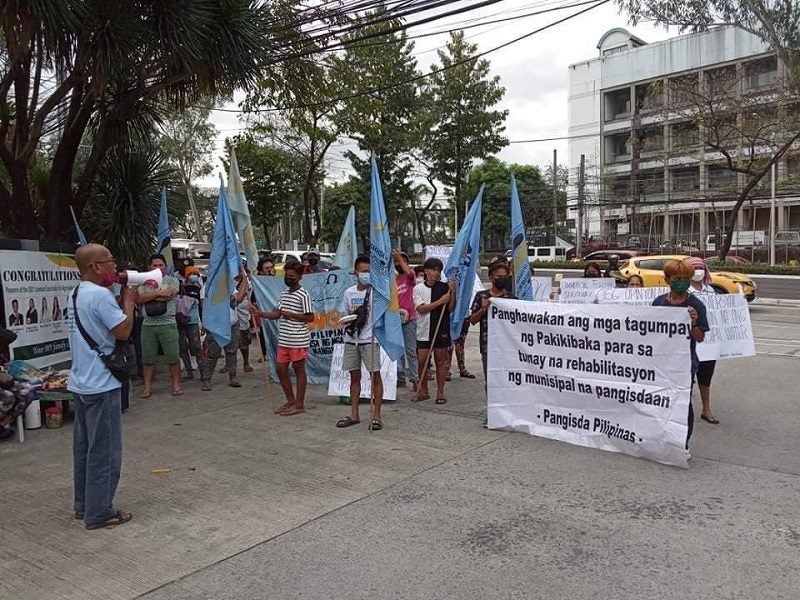Fisherfolk groups, PANAGAT, Oceana score slow implementation of vessel monitoring measures (VMM) rules as certain commercial fishers announce refusal to comply with it
Press Release Date: February 10, 2022
Fisherfolk leaders urge the full implementation of vessel monitoring measures (VMM) on all commercial fishing vessels weighing 3.1 gross tons and higher, contrary to the revised legal opinion recently issued by the Office of Solicitor General on this matter.
“Ipinaalala ko sa lahat na ang kabuhayan at pagkain ang ipinagkakaloob sa atin ng pangisdaan kaya’t marapat lamang na ito’y ating pangalagaan, sundin ang batas at ipatupad ang vessel monitoring measures ngayon,” said Ruperto Aleroza, Chairperson of Pambansang Katipunan ng mga Samahan sa Kanayunan (PKSK) and Vice Chair for the Basic Sectors of the National Anti-Poverty Commission.
Fisherfolk leaders, PaNaGaT including international marine protection organization, Oceana press the Department of Agriculture-Bureau of Fisheries and Aquatic Resources (DA-BFAR) and the National Telecommunication Commission (NTC) to perform their mandates and ensure the full implementation of the vessel monitoring measures (VMM) in all commercial fishing vessels weighing 3.1 gross tons and higher, contrary to the revised legal opinion recently issued by the Office of Solicitor General on this matter.
The Pangingisda Natin Gawing Tama (PaNaGaT) Network call on the BFAR and the NTC to stand firm in implementing the Fisheries Administrative Order 266. “We condemn the continued violations committed by commercial fishing vessels and call on enforcement agencies to include non-compliance to vessel monitoring measures in the list of violations of apprehended vessels,” the coalition of fisherfolk and civil society organizations said in their statement.
“Requiring the installation of vessel monitoring measures on commercial fishing vessels is a requirement of Republic Act 10654, the Fisheries Code, as amended. FAO 266 is the implementation of this absolute requirement to strengthen the monitoring, control and surveillance system required by the law to encompass all Philippine flagged fishing vessels. Agriculture Secretary William Dar already vowed to implement vessel monitoring measures. The recent reversal in the position of the Office of the Solicitor General on FAO 266 implementation is baffling, to say the least,” said Atty. Gloria Estenzo Ramos, Oceana Vice President.
Secretary Dar signed FAO 266 on October 12, 2020 after the National Fisheries and Aquatic Resources Management Council, which includes both representatives from municipal and commercial fishing sectors, endorsed the final version for approval.
BFAR’s record on the status of implementation of the vessel monitoring measures, as of January of this year, has already reached 50% or 1,526 of the 3,077 total commercial fishing vessels with license that are plying the country’s territorial waters.
When Oceana started pilot testing the technology in 2016, municipal fisherfolk and local government officials welcomed this as a tool to monitor and apprehend vessels that would illegally fish in municipal waters and keep the ocean and fisheries resources healthy and abundant.
Meanwhile, certain commercial fishing vessel owners and operators and groups have publicly announced their defiance of the law.
Ramos asked why would the commercial fishers not want their fishing activities tracked and monitored? “Illegal fishing has remained a problem even if we have the law. The intrusion of commercial fishers in municipal waters caused this problem of overfishing. Our fish stocks are continuously decreasing at an alarming rate. This has caused unjust suffering to poor artisanal fisherfolk that’s why the government has to abide by its mandate to protect the coastal communities’ livelihood and the food security of the Filipino people,” she added.
The municipal water is the critical 15-kilometer zone from the shoreline of our oceans that is the spawning ground of fish and their habitat. Commercial fishing vessels are prohibited from entering the municipal water, according to the Amended Fisheries Code.
PaNaGaT said those that continue to commit willful violation of RA10654 should be strictly sanctioned.
In a recent news report, Solicitor General Jose Calida reportedly advised the Bureau of Fisheries and Aquatic Resources (BFAR) and the National Telecommunications Commission (NTC) to comply with the ruling of the Malabon City Regional Trial Court (RTC) that declared Fisheries Administrative Order No. 266 as unconstitutional.
Oceana and PaNaGaT assert that RA 10654, or the amendatory law to the Fisheries Code prohibits trial courts from issuing injunctions, as provided under Section 134.
“Section 134. Prohibition on the Issuance of Temporary Restraining Orders, Preliminary Injunctions, and Preliminary Mandatory Injunctions. – No injunction or restraining order from the Municipal Trial Courts and Regional Trial Courts shall lie against the Department and BFAR upon the ex parte motion or petition filed by any person or entity in the exercise by the Department and BFAR of its regulatory functions in support of the implementation of this Code.”
The prohibition against the enforcement of environmental laws is further reiterated in the Supreme Court’s own rules on environmental cases, and the Office of the Court Administrator’s Circular No. 87-2016.
“Nananawagan kami sa BFAR at NTC na ipatupad ang vessel monitoring measures para masugpo ang commercial fishing sa municipal waters at makasuhan ang mga lumalabag sa batas,” appealed by Norlan Pagal, President of ANAK KO Fisherfolk Association.
2022 is the International Year of Artisanal Fisheries and Aquaculture. The fisherfolk leaders urge the government to respect the preferential rights in the municipal waters, as provided for by the Philippine Constitution.
Oceana is an international advocacy organization dedicated to protecting the world’s oceans. Since 2014, Oceana has been working closely with national and local government agencies, civil society, fisherfolk and other stakeholders to restore the abundance of Philippine fisheries and marine resources.
For more information:
Joyce Sierra, Communications Manager, Oceana
Mobile: 09178214430 E-mail: jsierra@oceana.org
Facebook: www.facebook.com/oceana.philippines
Twitter: @oceana_ph Instagram: @oceana_ph


